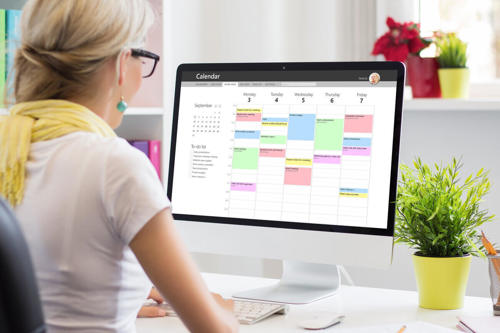
It used to be the norm that you would leave school, start working and then (ideally) stay in that job until retirement.
However, today the working world is rarely as straightforward as it was, and while this can be overwhelming, it offers great opportunity and potential for individuals to find true career satisfaction and a sense in purpose for what they do.
When switching careers, entering a new industry, or climbing the career ladder, you’ll often be required to gain a new qualification, or enhance and improve upon your skills in some way. Because of this, many of us are committing our time to studying while also working full-time in order to gain the relevant skills and knowledge we need to move forward in our careers.
In this blog we explore how to create a study routine when working full-time that will work for you.

First things first, you are going to want to utilise your time wisely. Time management systems vary from frameworks to techniques and are simply just methods to assist someone in manging their time a little better. Often students find they do have time in which they can study, they just don’t know it because they are missing the organisation component.
If say, you have two hours in the evening, post dinner, between 7pm and 9pm to study, why not try the 50/10 technique and study for 50 minutes, take a ten-minute break, and then study for another 50 minutes.
Working in slightly longer sprints means you are giving yourself time to absorb the information and digest perhaps more complex subjects, however, with the sprints being under one hour, they are still short enough that your brain doesn’t disengage or that you lose interest.
A few others that work specifically well when it comes to studying are:
However, it’s important not to get discouraged if one kind time management system doesn’t work for you. There’s plenty out there, and often it takes a few turns to find the one that works best for you.

This may sound like a no brainer, but the biggest reason as to why any individual may feel stressed or overwhelmed while studying, is because of the amount of work they have to do.
With what can seem like hundreds of tasks, prioritisation can really help you regain some control and therefore, stay on track.
It’s impossible to try and do everything at once, and if you try, the standard of each task will suffer! We recommend taking these five steps, which will help you prioritise while keeping a clear frame of mind.

Unless you’re working from home most of the time, you’ll have a commute and some spare moments of the day you’ll be able to utilise.
We’re not saying it’s a good idea to burn yourself out, however, your commute is a great time to get some extra studying in if you can.
A great way to do this would be to create some flash cards that you can carry around with you for some quick review, or perhaps if you’re studying something that’s a bit more text heavy, you could record yourself reading your notes, and listen to them back while you are travelling. In fact, some people find it easier to absorb information that they listen to, rather than reading it.

It can be beneficial to speak to your manager about the course you are undertaking, and the goals you have set out to achieve. Managers are often incredibly supportive of continuous learning and upskilling, and often want to know about your progress.
On the flip side, keeping your manager in the loop will also help them to help you, in terms of your workload, time management and energy levels.
Sometimes your employer may be the one putting you through your studies, meaning they might already have methods or structures in place to help you balance your workload.
Ask your manager about:

Depending on what kind of job you have, you may be one of the lucky ones that can:
If any of the above options are available to you, we would recommend utilising them. You won't be studying forever, so if you’re able to afford it, it could be an opportunity to free up some spare time and plan some strategic studying days.
We aren’t talking about weeks and weeks, however, if you are able to take a half day every Friday, or take a few Mondays a month off, every little bit of extra time will help on your studying journey.

When studying and working full time, there’s always going to be something you will have to sacrifice. Choosing what to put on the back burner while managing your expectations is great self-care, and it will help you avoid disappointment in the long run.
A few of our favourite self-care suggestions are:
Doing this will also help keep you motivated, giving you the chance to rest and recharge when you need it.
Realise your full potential and enrol on a professional course with DPG today!